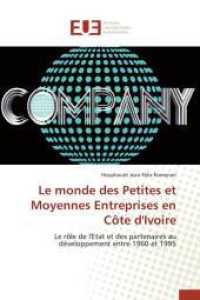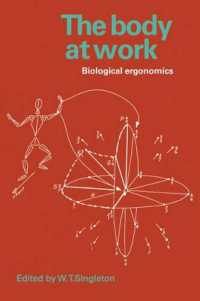- ホーム
- > 洋書
- > 英文書
- > Science / Mathematics
Full Description
This edited volume of papers from the twenty first International Conference on Chemical Education attests to our rapidly changing understanding of the chemistry itself as well as to the potentially enormous material changes in how it might be taught in the future. Covering the full range of appropriate topics, the book features work exploring themes as various as e-learning and innovations in instruction, and micro-scale lab chemistry. In sum, the 29 articles published in these pages focus the reader's attention on ways to raise the quality of chemistry teaching and learning, promoting the public understanding of chemistry, deploying innovative technology in pedagogy practice and research, and the value of chemistry as a tool for highlighting sustainability issues in the global community.
Thus the ambitious dual aim achieved in these pages is on the one hand to foster improvements in the leaching and communication of chemistry—whether to students or the public, and secondly to promote advances in our broader understanding of the subject that will have positive knock-on effects on the world's citizens and environment. In doing so, the book addresses (as did the conference) the neglect suffered in the chemistry classroom by issues connected to globalization, even as it outlines ways to bring the subject alive in the classroom through the use of innovative technologies.
Contents
Preface: Proceedings of 21st ICCE, Peter Mahaffy.- Introduction to the book, Mei-Hung Chiu, Hsiao-Lin Tuan, Hsin-Kai Wu, Jing-Wen Lin, Chin-Cheng Chou.- Section 1. Globalization and Chemical Education, Mei-Hung Chiu.- Dissemination of achievements in chemical education (research) via EU projects, Anna Kolasa, Iwona Maciejowska.- 2. Polish Education Reform and Resulting Changes in the Process of Chemical Education, Hanna Gulińska.- Section 2. Learning and Conceptual Change in Chemistry, Jing-Wen Lin.- Assessment of Chemistry Anxiety among College Students, Chen Chong Sheau Huey.- Teacher-Student Interactions: The Roles of in-Class Written Questions, Liliana Mammino.- Probing and Fostering Students' Reasoning Abilities with a Cyclic Predict-Observe-Explain Strategy, Jia-Lin Chang, Chiing-Chang Chen, Chia-Hsing Tsai, Yong-Chang Chen, Meng-Hsun Chou, Ling-Chuan Chang.- A Trial of Placement and Embodiment of Images for Chemical Concepts in the Lesson Model of "Surface Active Agent" through SEIC, Haruo Ogawa, Hiroki Fujii.- Section 3. Teaching Chemistry, Hsiao-Lin Tuan.- Chemistry pre-service teachers' mental models of science teaching and learning in Malaysia, Maryam Sulaiman, Zurida Haji Ismail.- Chemistry Teachers Enhance their Knowledge in Contemporary Scientific Areas, Rachel Mamlok-Naaman, Ron Blonder, Avi Hofstein.- Practical Science Activities in Primary Schools in Malaysia, Norita Mohamed, Mashita Abdullah, Zurida Hj Ismail.- Teaching Chemistry Effectively with Engineering Majors: Teaching Beyond the Textbook, Yermesha Kyle; Stephen Bacon; Amber Park; Jameka Griffin; Raicherylon Cummins; Raymond Hooks, Bailu Qian, Hua-Jun Fan.- Problem-Based Learning as an Approach to Teach Cell Potential in Matriculation College, Malaysia, Kai-Li Teh, Nooraida Yakob.- Teaching Catalysis by Means of Enzymes and Microorganisms, Peter Grunwald.- The Application of the SATL in Biochemistry, Suzana B. Golemi.- Section 4. Curriculum, Evaluation, and Assessment in Chemistry Education, Mei-Hung Chiu.- An Alignment Analysis of Junior High School Chemistry Curriculum Standards and City-Wide Exit Exams in China, Hongjia Ma, Gavin W. Fulmer, Ling L. Liang, Xian Chen, Xinlu Li, Yuan Li.- A National Survey of Students' Conceptions and Their Sources of Chemistry in Taiwan: Examples of Chemical Equilibrium and Acids/Bases, Jing-Wen Lin, Mei-Hung Chiu.- The use of electronic media for chemical education research, Francis Burns, David Frank.- Investigation of Tertiary Chemistry Learning Environment in Sabah, Malaysia, Yoon-Fah Laya, Chwee-Hoon Khoob.- The Evaluation of Chemistry Competence for Freshmen at Technology Colleges in Taiwan, Ji-Chyuan Yang, Ching-Yun Hsu, Wen-Jyh Wang, Chia-Hui Tai, Hong-Hsin Huang, Ping-Chih Huang.- Changes in Teachers' Views of Cognitive Apprenticeship for Situated Learning in Developing a Chemistry Laboratory Course, Hui-Jung Chen, Mei-Hung Chiu.- Section 5. E-learning and Innovative Instruction, Hsin-Kai Wu.- Application of Mind Map and MindManager to Improve Students' Competence in Solving Chemistry Problems, Zhen Lu, Zheng Zou, Yitian Zhang.- An Integrated-ICT Assessment for College Students' Performances of Chemical Learning, King-Dow Su.- Academic Performance and Attitude Toward Computer-Aided Instruction in Chemistry, Ronaldo C. Reyes.- Integrating Instant Response System (IRS) as an In-Class Assessment Tool into Undergraduate Chemistry Learning Experience: Student Perceptions and Performance, Tzy-Ling Chen, Yan-Fu Lin,Yi-Lin Liu,Hsiu-Ping Yueh, Horn-Jiunn Sheen, Wei-Jane Lin.- Section 6. Microscale Lab Chemistry, Chin-Cheng Chou.- Aqueous cationic and anionic surfactants for microscale experiments in organic chemistry teaching laboratories, Masayuki Inoue, Yuko Kato, Emi Joguchi, Wataru Banba.- Development of Analytical Method of Gaseous Mixture by Using a Syringe, Takashi Yasuoka.- Microscale Experiments Using a Low-Cost Conductance Meter, Jose H. Bergantin, Jr., Djohn Reb T. Cleofe, Fortunato Sevilla III.- Introducing Microscale Experimentation in Volumetric Analysis for Pre-Service Teachers, Mashita Abdullah, Norita Mohamed, Zurida Hj Ismail.- Innovative Techniques in Micro-scale Chemistry Experiments, Kwok Man Chan.- Microscale Experiment on Decreases in Volume when Forming Binary Liquid Mixtures: Four Alkanol Aqueous Solutions, Tetsuo Nakagawa.


![おとあそびえほん シナぷしゅ どうぶつ・のりもの [バラエティ]](../images/goods/ar2/web/imgdata2/40994/4099425347.jpg)





